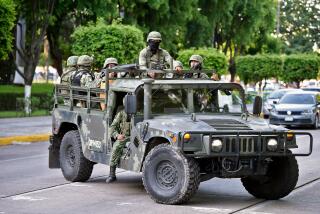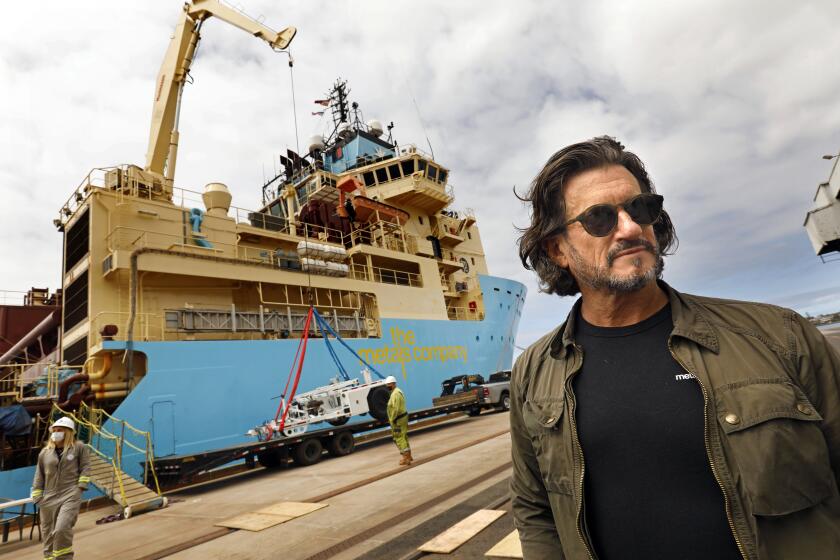U.S. Africa Policy Shifts With End of Cold War : Diplomacy: Bush Administration is now encouraging true democracy instead of just countering communism.
For the past four decades, an era in which most African nations gained their independence, U.S. policy toward the continent has been driven by Washington’s determination to check Soviet influence. This was true, even if it meant propping up corrupt, tyrannical dictators with little more to offer than anti-Communist rhetoric.
Now, freed from the ideology of the Cold War, the Bush Administration has embarked on a program of encouraging genuine democracy in Africa. And U.S. officials say the prospects for African pluralism are better than they have ever been, although they caution that it will not be possible to transplant U.S. democracy without change.
Herman J. Cohen, an assistant secretary of state and the Administration’s top Africa expert, said that increasing amounts of U.S. aid to African nations will be earmarked for support of democratic pluralism in a continent known for presidents-for-life and military strongmen.
“It is the civic associations, it is the independent judiciary, it is the free press that will make democracy work,” Cohen said in a recent speech. “I think you will see more and more aid and the whole scope of U.S. government assistance aimed essentially at the ‘governance’ that is so important for the good working of democracy.”
The new emphasis already has produced results. The United States paid the expenses of the independent observers who supervised Zambia’s first free multi-party election last October, in which President Kenneth D. Kaunda, the nation’s leader since independence, was voted out of office. Washington also has financed smaller projects, such as publication of a pamphlet outlining citizens’ rights in Ghana and establishment of a human rights watchdog group in Nigeria.
“Two years ago, we had about $500,000 in small grant programs,” one State Department official observed. “Last year, the total expenditure for democratization in Africa was $30 million, which included $10 million to support the South African political process. This year we expect it to be about $40 million.”
Considering Africa’s towering needs, that is not a lot of money. U.S. officials concede that it is not easy to obtain funds for foreign aid in an environment of big deficits and tight budgets in Washington. The total aid budget for Africa is only about $1 billion a year.
But Cohen maintains that U.S. influence involves far more than America’s share of the world’s foreign assistance to African nations. “Africans continually come to the only remaining superpower to solve their problems,” Cohen said in a recent interview. “They all want to maintain strong contacts with us, even though our foreign aid budget is (only) sixth in the world.”
The United States has always maintained that the objective of its foreign policy is to promote democracy, not only in Africa but around the world. But throughout the Cold War, Washington effectively allowed Moscow to set the ideological tone: Countries were either Communist, or they were not. And those that were not were characterized as members of the “Free World,” even if freedom was an alien concept within their borders.
That dichotomy explains how the United States became the patron of a ruthless dictator like Mobutu Sese Seko of Zaire, a discredited despot like Jaafar Numeiri of Sudan and an oafish autocrat like Samuel K. Doe of Liberia. And it explains how Washington became close to Daniel Arap Moi of Kenya, who is inching unenthusiastically toward multi-party politics after presiding over a one-party government since 1982.
“No other great power is as responsible as the United States for what happened in Liberia, Sudan and Zaire,” Michael Clough, a senior fellow of the Council of Foreign Relations, wrote in a recent book. “Without U.S. support, Doe and Numeiri would not have survived as long as they did, and Mobutu would not still be in power.”
This is doubtless true. While Liberia and Sudan are now rid of the dictators, they still are gripped by bloody civil wars. Administration officials say the United States has ended most support for Zaire and Kenya, but it would be a mistake for foreign powers to take direct action to force out Mobutu and Moi.
“We do not deal with individuals and say they have to leave,” Cohen said. “We don’t tell Mobutu to go or Moi to go. We didn’t even tell Samuel Doe to go.”
Washington is more blunt with leaders of Africa’s new revolution, which has brought at least the start of pluralistic democracy to Zambia, Benin, Congo, Togo and others. “When new people come to power, we are telling them, ‘No democracy, no assistance,’ ” Cohen said. “The new regimes do not have any grace period.”
On Capitol Hill, Sen. Paul Simon (D-Ill.), chairman of the Africa subcommittee of the Senate Foreign Relations Committee, agreed that “democracy is spreading across Africa.” But he said the Administration deserves little credit.
“Unfortunately, this Administration has a love affair with dictators,” Simon said. “Mobutu is clearly corrupt, clearly unpopular, and he has been doing all the wrong things. We ought to sever all ties with Mobutu and make clear that we are for democracy.”
Most Africa experts applaud the Administration’s new attitude. But some say that democracy does not stand much of a chance unless Africa makes enough economic progress to guarantee a good life for its people. And economic development will require a transfusion of money that goes far beyond the sums that the United States and the rest of the developed world seem prepared to give.
“The United States should encourage the forces of democratization, but not necessarily tie that support to any kind of rigid ideological concerns,” said Edmond Keller, a UCLA professor of political science and president of the African Studies Assn. “The Administration should realize that foreign policy can sometimes be driven by humanitarian and social considerations, not only strategic ones. A peaceful Africa that can feed itself would be in the strategic interest of the United States.”
Simon said he fears that the Administration will just ignore Africa now that Cold War concerns no longer apply, noting: “We are already ignoring it too much; 28 of the world’s poorest countries are in Africa.”
So far, no real domestic constituency has lined up to support U.S. economic aid for Africa. Unlike Americans with religious and ethnic ties to Israel and some Eastern European countries such as Poland, Armenia and Ukraine, black Americans have not made Africa a matter of top concern. But this may be changing. If it does, aid levels for Africa will certainly go up.
Nevertheless, U.S. interest in Africa remains primarily humanitarian in its focus: promotion of democracy, alleviation of poverty and protection of human rights. It is in just those areas, however, that the post-Cold War world offers the greatest opportunities.
Americans will always respond to famines like the one in Ethiopia in the mid-1980s or to gross violations of human rights like apartheid in South Africa, said I. William Zartman, director of Africa Studies at Johns Hopkins University’s School for Advanced International Studies in Washington. But they are often slow off the mark when there is a chance to head off such crises.
“Africa should be a real challenge for our technology and our humanity,” Zartman said. “This is a place for helping out everything that we believe in.”
More to Read
Sign up for Essential California
The most important California stories and recommendations in your inbox every morning.
You may occasionally receive promotional content from the Los Angeles Times.





